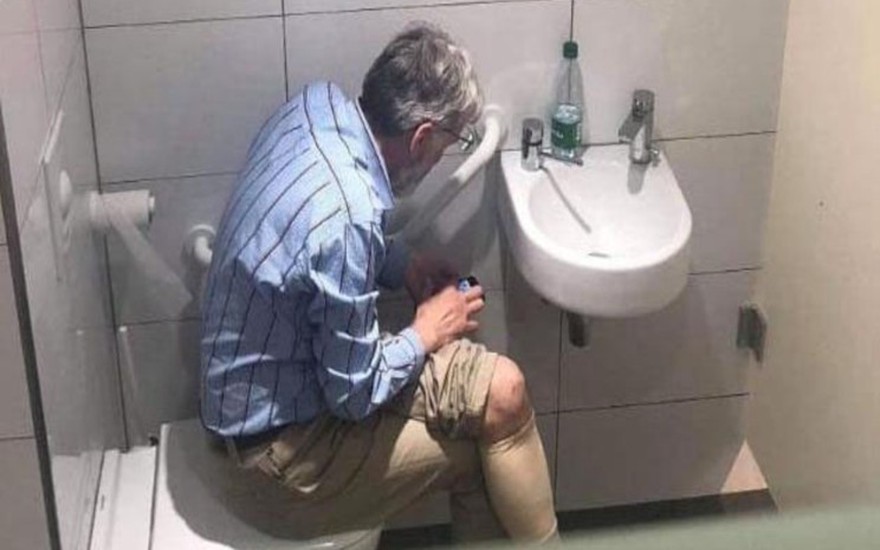
https://nypost.com/2019/07/13/chess-grandmaster-allegedly-caught-cheating-on-toilet-during-tournament/
Cheating: An offender's recount
This blog is an anecdote & observation about cheaters.Introduction
I want to start by addressing the thumbnail of this blog involving former Grandmaster Igors Rausis. There are a few serious issues:
- There is toilet paper pointing towards Igors like a paper clip does to a magnet.
- Igors left a water bottle on the faucet. Very unhygienic, Igors.
- I'm not judging the photo taker, but where's the respect for Igors' privacy? It would be a nightmare if you had to deal with a peeping tom, yes?
- Igors is cheating by using his phone (to analyze a chess position) while he is in an ongoing game.
While I can't relate to the first 3 issues, I want to dive a bit deep into the last one. Igors is one of many people who have fallen into the temptation to cheat.
What's the definition of cheating (in chess) anyways? The New York Times defines it as,
a deliberate violation of the rules of chess or other behavior that is intended to give an unfair advantage to a player or team.
"Cheating can occur in many forms and can take place before, during, or after a game. Commonly cited instances of cheating include: collusion with spectators or other players, use of chess engines, rating manipulation, and violations of the touch-move rule. Many suspiciously motivated practices are not comprehensively covered by the rules of chess. On ethical or moral grounds only, such practices may be judged by some as acceptable, and by others as cheating." (Excerpt taken from Wikipedia)
Why cheat?
But why have people, including myself, fallen for this temptation, whether in online or real-life games? From my experiences, there are 5 reasons (some of these overlap) for why people cheat in chess:
- They want to troll other people to get a laugh.
- They want revenge against their opponents for the losses suffered.
- They want money and cheat in games to win some cash.
- They want to avoid their fears from happening. (This gets bucketed into #5, I suppose)
- Their ego manifests and leads to people doing what makes them avoid pain, feel relief & comfort.
I want to expand on the last point here the most because I think it is the primary driver of repeat cheating offenders.
Case study: Yours truly
By the above definition in the Introduction, Igors received an unfair advantage and cheated. Beyond him though, take me as a case study.
About me: From 2011 to 2012, I was stuck around 1600 for a couple of years. Being a young, dumb kid back then. I was tired of losing. I was in general unhappy about my rating.

What I ended up doing for the next year and a half was something I'm not proud of now. I don't remember when I first tried it out, but it started when I had a program, Chessmaster 10th edition (great learning for chess I must add). I had thought of using Chessmaster's engine to play chess positions. Of course, we all use the engine to analyze positions, so it started there. I tried playing against the engine a few times and lost horribly, of course.
One day, when I was playing on chess.com, I had lost yet another a few games, so I persuaded myself to pull out the engine in a few games against some people and won all of my games. I can't recall if the experience was thrilling, but what I do remember from the experience was that I felt compelled to avoid losing. It was interesting to finally beat higher-rated players. Naturally, after about a week I got banned for engine assistance on the live server.
It was clear to me, in hindsight, that I was addicted to cheating since gave me great results and appeased my ego. So, I came back, did it again on a new account, but this time I was more clever about it. I stopped caring about my live online games, so I ended up moving over to correspondence chess and mastered my craft in cheating. It was a challenge to play engine moves while not getting caught. I would get caught after a couple of months on the new account, start a new one, get caught on the next one after 5 months, start a new one, get caught after about a year. I was pretty good at being a deceptive cheater too.

However, on the final account that I got caught on, something hit home for me. I liked chess.com a lot because of the forums you could write (much like lichess lets users finally do). My account was closed and I lost 200+ threads I worked hard to write in chess.com's forums. So, when I lost the ability to post and lost my archive of threads, that was the final straw for me.
I wrote an apology to a chess.com staff member saying I cheated, but I lied in the apology about the magnitude of my offenses. I think I lied, even after being banned, because I cared about what people thought of me at the time, trying to keep the negative public reaction to a minimum. I cared about my self-image of being an explorer of chess positions and appearing to know a lot about chess. Unfortunately for me, I had hit rock bottom here.

Closure
Since the ban, I've been sober and quit cheating altogether. The experience taught me about human behavior (how the human ego works) and also how empty the feeling of cheating is when it came to competition & advancing your self-worth. It was an empty, soulless pursuit. That realization helped me greatly in quitting my addiction. Thankfully, I'm a much happier and helpful person nowadays. I've worked hard since the ban to improve my rating and am inching closer to Master strength.
I know I'm not a perfect person, but I think I can relate a bit to other people here. If you're struggling with an addiction of any kind, by all means, feel free to message me privately. Maybe I can help you out.
"Just because someone stumbles and loses their way, it doesn't mean they are lost forever. Sometimes we all need a little help."
- Professor Xavier from X-Men Days of Future Past here
While I do not condone cheating, I do think it is interesting to understand what's going on in people's heads when they cheat on exams, tests, or anything in life. Understanding the motivations behind cheating is how I came to produce the video on my YouTube channel here:
https://www.youtube.com/watch?v=QeZ64Hmc4F0
Anyways, I hope this was an interesting read for you.
Best,
InfiniteFlash

